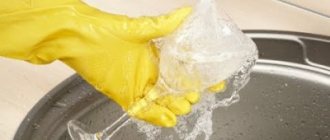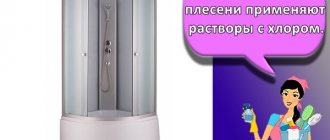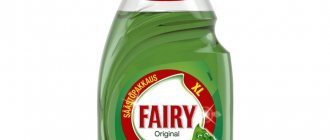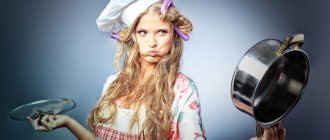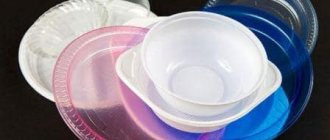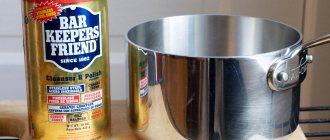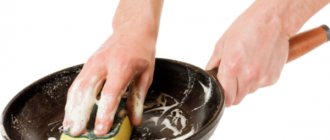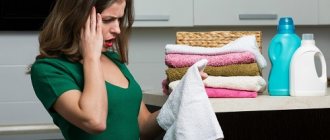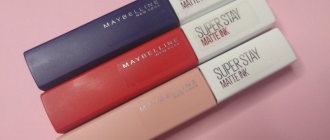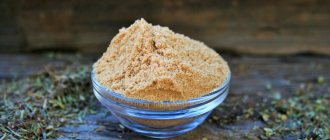Store-bought dishwashing detergents are effective, allowing you to easily wash even quite complex stains, but their composition, in most cases, is not ideal.
The substances they contain, even with thorough rinsing, may remain partially on the dishes and enter the body with food. The solution to the problem may be the use of homemade drugs.
We will tell you further about how and what to wash dishes without using detergents.
Traditional recipes without chemicals
To clean dishes, you can use readily available, inexpensive products that give a good effect when washing surfaces in contact with food.
Dry mustard
Mustard powder is an affordable eco-friendly product for washing dishes, including children's dishes. It effectively copes with various types of dirt - grease, dried food residues, etc.
Mustard can be used in two ways: in dry form for rubbing soiled areas and in the form of a solution. If there are a lot of dishes to wash or they are in a neglected state, it is better to prepare a solution for soaking.
Procedure:
- Hot water (3-5 liters) is filled into a basin.
- Pour mustard powder (3 tablespoons) into it.
- Stir.
- Soiled kitchen utensils are immersed in water and left for 10-15 minutes.
- Using a sponge, wash the dishes.
- Rinse.
Lemon
Fresh lemon juice has the ability to break down fat, fight odors, and even cope with limescale and rust stains.
In order to wash dirt from frying pans and other utensils, this option is suitable:
- cut off a slice of lemon;
- dip lemon in salt;
- rub the dirty dishes with a slice;
- rinse the surface with water;
- repeat the lemon treatment;
- After finishing cleaning, wipe the surface with a paper towel.
Lemon can be used not only for routine dishwashing, but also for processing cutting boards. To do this, squeeze the juice out of the fruit and apply it to the entire surface that needs cleaning. After 20 minutes, the board can be washed with water.
If you need to eliminate an unpleasant odor from the surface of a cutting board, for example, left after fish, the surface should be wiped with lemon and soda. After treatment, rinse under the tap.
Baking soda
Baking soda is a universal remedy that will help you deal with dirty dishes. It cleans some stains even better than store-bought gels , allowing you to effortlessly remove tea stains and lipstick marks from cups.
Baking soda not only cleans well due to its abrasiveness, but also disinfects. Soda can also cope with an old layer of fat, but it is advisable to first soak such dishes in a soda solution, and only then scrub them.
Soda should not be used to clean non-stick coatings, as well as aluminum, which reacts and darkens when in contact with this substance.
Baby soap with soda
To prepare a paste of soap and soda you will need the following ingredients:
- soda (0.25 kg);
- baby soap (1 bar);
- water heated to warm temperature (2 glasses).
Preparation procedure:
- Grate the soap.
- Place soap shavings into a bowl.
- Add a glass of water.
- Beat with a fork or mixer until the consistency becomes homogeneous.
- Add the rest of the water.
- Add baking soda, continuing to whisk until smooth.
You need to store homemade soap paste covered in a glass jar.
Soap, baking soda and vinegar
To process dishes using improvised means, a recipe based on laundry soap can be used. The consistency of the resulting product is a liquid preparation, which is convenient to apply using a sprayer.
You need to prepare the following ingredients:
- dark laundry soap, without additives (1/4 bar);
- soda (1 tbsp);
- vinegar (1 tbsp);
- essential oil with a pleasant citrus or pine aroma (a few drops);
- water (1 liter).
Procedure:
- Grate the soap.
- Dissolve soap shavings in water.
- Add remaining components.
- Mix.
- Pour into a spray bottle.
The most convenient way is to dissolve soap in water using a water bath.
Baking soda and hydrogen peroxide
A folk recipe based on available ingredients will help you wash dirty dishes, stained baking sheets and the stove.
To work you will need the following ingredients:
- hot water (1 glass);
- soda (1 tbsp);
- hydrogen peroxide (1 tbsp).
All components are combined and the mixture is poured into a spray bottle. To achieve the result, you need to spray the product onto the surface and leave it for 10 minutes. Afterwards, rinse with water.
Soap with glycerin
For washing dishes, you can prepare a simple product that will not only cope with dirt, but also will not dry out the skin of your hands.
You will need the following components for this:
- dark laundry soap, without additives (1/4 piece);
- glycerin (5 tbsp.);
- essential oil (a few drops);
- alcohol solution of calendula (1 tbsp.);
- water (1/2 cup).
Preparation:
- Grate the soap.
- Place in a water bath, adding water to the chips.
- Stir the solution until the soap is completely dissolved.
- Pour in glycerin.
- If desired, you can add a few drops of essential oil and mix.
- Add calendula solution.
- Mix again.
After cooling, the mixture will thicken slightly, turning into a gel form.
Benefits of Baking Soda Cleaners
Sodium bicarbonate is the sodium salt of carbonic acid. The acid-base balance of the substance is close to neutral, its value ranges from 5 to 7. This makes baking soda absolutely safe and can be used without the use of protective equipment. In addition to being gentle on your hand skin, the benefits of this cleanser include:
- ease of use;
- availability;
- low cost;
- absence of large abrasive particles;
- compatibility with other agents and substances;
- abundance of recipes and methods of application;
- quality proven by many years of experience.
Sodium bicarbonate can replace most household chemical products in the cleaning and washing process without compromising the final result. Low consumption of the product will allow you not to think about buying a new pack for almost months.
Danger of detergents
Chemicals contained in purchased preparations may remain on the surface of the dishes after the cleaning procedure. It will not be possible to completely wipe them off. They will enter the human digestive tract. It is estimated that within one year you can accidentally consume approximately 500 ml of detergent compositions. The health effects may be unpredictable. First, allergic reactions begin, which can lead to tumors of the gastrointestinal tract.
Attention!
If you are still accustomed to store-bought drugs and do not want to give them up, then wash the dishes immediately after each meal.
By getting into the habit of washing mugs and bowls after every meal, you will be able to save detergent, since fresh stains are washed off with warm water. You won’t end up with mountains of dishes that will then take a long time to wash.
Instead of store-bought ones, gradually move on to the following folk remedies:
- laundry soap;
- mustard;
- baking soda;
- soda ash.
All these products have advantages, but are not without disadvantages. But all the disadvantages that we will describe here will still cover the advantages of a conventional chemical product.
Removing contaminants from metal
You can also tidy up a stainless steel faucet or clean a shower head to a shine using sodium bicarbonate. In this case, the additional active ingredient will be ammonia. The method for preparing the cleaning paste is quite simple and includes the following components:
- 250 grams of laundry soap;
- liter of hot water;
- 6 tablespoons of baking soda;
- 6 tablespoons dry mustard;
- 5 tablespoons of ammonia.
Laundry soap is crushed with a grater and dissolved in half the total volume of water. The remaining water is poured into the soap solution and brought to a boil. After cooling, the remaining components are carefully introduced into the resulting solution one by one. After hardening, you should get a viscous paste.
Recommended for you:
How to clean a sofa with baking soda at home
The mixture must be stored in a closed container. When using, do not leave the substance on stainless steel surfaces for a long time. A couple of minutes is enough to remove dirt.
In addition to faucets and metal bathroom elements, a cleaning agent based on soda and ammonia will help clean stoves, stainless steel sinks, steel utensils and kettles. Due to the presence of ammonia in the composition, you should not allow direct contact with the skin of your hands.
Detergents made from baking soda cope with a wide variety of stains and clean almost all types of materials and surfaces. In addition to effectiveness, the advantages of such compositions include gentle treatment of the skin of the hands and absolute safety for health (with the exception of attempts to consume the substances as food).
Industrial household chemicals often cause dermatitis and allergic reactions, and due to their impressive chemical composition, it is simply impossible to determine the allergen.
By preparing cleaning mixtures at home, you can be sure of their naturalness. Using environmentally friendly cleaning products is a very important step towards a healthy lifestyle.
Mustard powder
The product removes dirt from surfaces well.
Components for preparing a mustard-based detergent composition:
- water;
- soda;
- mustard powder.
6 Homemade Dishwasher Cleaners
Algorithm of actions:
- Heat 1000 ml of water.
- Add 20 g of mustard powder to the liquid.
- Stir the mixture until foam forms.
- Add 30 g of soda (helps to form a cleaning paste).
Advantages of the product: no foam, compliance with environmental requirements.
Main Ingredients
Dishwashing detergent has several tasks: to dissolve fats, clean plaque and carbon deposits, and disinfect. In addition, you need to take care to protect the skin of your hands and have a pleasant smell.
Dirty dishes require a comprehensive approach to constant washing and regular cleaning
So, let's figure out what you need to prepare an effective and safe dishwashing detergent that will cope with all your tasks.
Fat solvents
First of all, it should be said that fats dissolve better and are washed off from dishes with hot water . Therefore, if it is not there, you will have to heat it on the stove to 40-45 ℃. Dishes made from high-quality materials that can withstand high temperatures can simply be doused with boiling water and then rinsed under running water, wiping the surface with a sponge without any additional means.
Under hot water, grease from plates can be easily washed off with a sponge.
Mustard powder is an affordable natural remedy that breaks down fats well. The only negative is that it does not cope well with complex contaminants in cold water. Mustard is used both in pure (dry powdered) form and in custard form; mixed with other components that enhance its effectiveness and allow you to make a more effective liquid dishwashing detergent with your own hands.
Laundry soap . Its universal properties are widely used in everyday life, from removing stains of various origins to washing hair. This type of soap is considered environmentally friendly and hypoallergenic, since it does not contain synthetic substances, dyes or flavors.
There are only two components in laundry soap - sodium or potassium salt and fatty acids.
Instead of laundry soap, you can use baby soap, bleach soap, or any toilet soap.
Abrasive powders
Many ready-made pastes and gels for dishes contain small particles of spar, silica, pumice, sand and other insoluble minerals. The presence of solid powder abrasives with varying degrees of grinding allows you to mechanically scrub off dense contaminants - plaque, soot, scale.
The larger the abrasive particles in the cleaning product, the greater the likelihood of damaging the surface being scrubbed.
The easiest way to ensure that your homemade dishwashing detergent cleans well and does not scratch the surface too much is to use soda (baking or soda ash). Also, environmentally friendly abrasives can be mustard powder, grounds from brewed ground coffee, crushed chalk or crushed eggshells.
Disinfectant additives
Leftover food serves as an excellent breeding ground for bacteria, so when washing dishes it is important to take into account such an aspect as disinfection.
If you want to make a disinfectant dishwashing detergent with your own hands, then use alcohol-containing liquids (vodka, ethyl alcohol or ammonia) and hydrogen peroxide as antiseptic and antibacterial additives.
Alcohols, especially ammonia, should be added in small quantities, given their pungent and often unpleasant odors.
Softeners and flavors
The products listed above will help you wash dirty dishes efficiently, but many of them dry out the skin of your hands and smell bad.
Natural essential oils simultaneously soften and scent homemade cleaning products
A good softening effect is achieved by adding liquid glycerin . And in order to make dishwashing detergent and ensure that it is gentle not only on your hands, but also on your sense of smell, the simplest and most accessible means are all kinds of essential oils . The main thing is to take natural ones that you like by smell and in small quantities.
Consider the possibility of allergic reactions to certain types of oils. To reliably protect the skin of your hands, make it a rule to wash dishes with gloves.
Now we offer you several standard home recipes on how to make dishwashing detergent with your own hands. They can be followed exactly or considered as basic, making your own changes and additions.
Washing dishes with soda
There are two types of soda: baking soda and soda ash. Each of them has advantages, as well as one big disadvantage. Soda powder is highly corrosive to the skin, so either immediately abandon this option, or use protective agents, which we have repeated more than once.
Baking soda has no disadvantages, as it can be used for any type of dishwashing. It copes with many types of dirt; you can even clean stains left by tea or coffee with it. All you need to do is dissolve the powder in water: one tablespoon per liter of liquid.
Attention!
Soda has one important advantage. It very effectively cleans all plaque and scale, returning the dishes to their original shine.
Soda is environmentally friendly, so it can be used for allergy sufferers and children. You can combine soda with mustard, as the cleaning effect is much better than separately.
Soda ash has been used since ancient times. It has been used in households for many decades. But you must immediately understand that it is very caustic, so we recommend wearing gloves. The product can be used in different ways; one of the universal ways is to leave a solution of soda and water on the surface of items prepared for cleaning. It will get wet and will be easy to clean any surface afterwards.
The second method is to pour baking soda powder onto a damp sponge and wash the dishes with it. If you need to remove fat, it is best to dissolve a few tablespoons in hot water. Soak bowls and plates in this solution. But after this method you need to rinse them thoroughly.
If we talk about other methods, they are less effective than those that we have described, so there is no point in dwelling on them. We only write about things that may interest you, so we can give you some tips on how to organize your work so that it is not a difficult process.
Reviews
Oksana R. Voronezh
My mother has been washing dishes exclusively with laundry soap or soda for a long time. I recently discovered liquid laundry soap and says it’s very convenient. Since switching to natural detergents, there have been no problems with the skin of my hands at all. Before that, it was scary to look at my hands, they were always covered in allergic red spots. I myself am also thinking about switching to baking soda and soap, the smell really bothers me.
Anna S. Tambov
I haven’t tried washing with soda, but I only wash my plumbing fixtures with it. I start to choke from the strong smells of household chemicals, especially if there is chlorine in the composition. Therefore, soda is very helpful. The same goes for washing dishes; you are allergic to half of the products you buy. It got especially worse in winter, so I tried using baking soda. The efficiency is no worse, the plates are washed until they squeak, and there is not a trace of plaque on the cups. And all this pleasure for ridiculous money. And the packaging is almost eternal, consumption is minimal.
Which is your favorite and why?
Write in the comments:
Comments (2)
slastenka_snastenka June 28, 2022 10:02:21 pm I was very impressed with the dishwashing liquid from the Pipper Standard brand with lemon. It cleans dishes efficiently and quickly from dirt and is easily washed off with water. After use, the dishes sparkle clean. The product does not dry out the skin on your hands at all and takes care of delicate skin.
Elena June 28, 2022 5:10:33 pm I love BioMio with tangerine extract. I enjoy the aroma of ripe real tangerine while washing dishes. Works well with fat. I also wash vegetables and fruits with it.
What is the safest dishwashing detergent?
Adherents of eco-products expect to purchase a cleaning product that will be classified as safe for humans and nature. These products are made from raw materials of organic origin. It should not contain phosphates, formaldehydes, or various dangerous surfactants.
Detergents are biodegradable, do not have a negative effect on the skin of the hands, and do not cause irritation to the respiratory tract. At the same time, they wash away dirt well, leaving no traces or odor behind.
Such eco-products include SODASAN Lemon, Frosch Green Lemon, Lion Chamgreen Charcoal, PURE WATER, Synergetic Gel, BioMio. These products are used for cups, pacifiers and bottles that are intended for children. The use of rubber gloves is not necessary.
Manufacturers warn that even the most environmentally friendly products must be used strictly for their intended purpose and used according to the attached instructions.
Household chemicals should be stored in places inaccessible to children. Rate this article:
